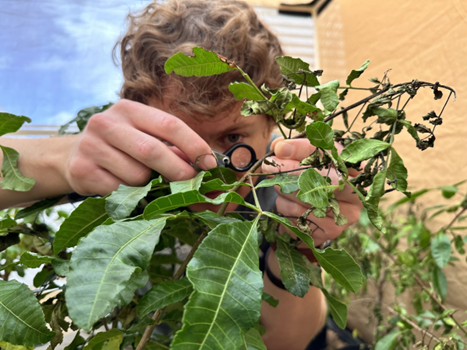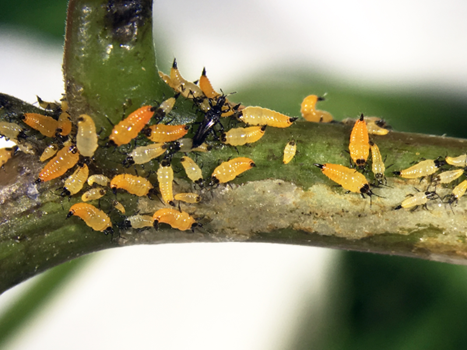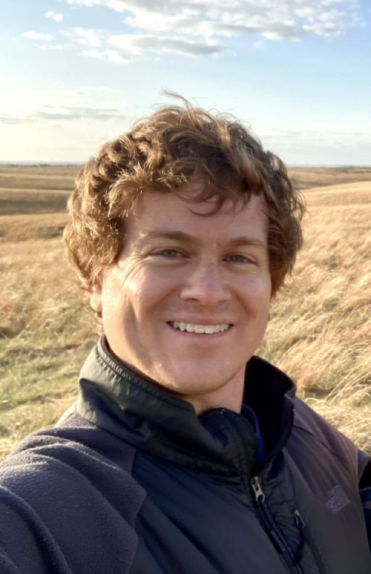Research Entomologist
- (Clicking on the reprint icon
 will take you to the publication reprint.)
will take you to the publication reprint.)
- Pruning Brazilian pepper trees to augment field populations of the biological control agent Pseudophilothrips Ichini
 -(Peer Reviewed Journal)
-(Peer Reviewed Journal)
Wheeler, G.S., Minteer, C., Palacios, J.N., Halbritter, D.A., David, . 2024. Pruning Brazilian pepper trees to augment field populations of the biological control agent Pseudophilothrips Ichini. Biological Control. 105550. https://doi.org/10.1016/j.biocontrol.2024.105550.
- Changes in plant architecture in Brazilian peppertree damaged by the biological control agent, Pseudophilothrips ichini Hood (Thysanoptera: Phlaeothripidae)
 -(Peer Reviewed Journal)
-(Peer Reviewed Journal)
Halbritter, D.A., Kariuki, E., Wheeler, G.S., Rayamajhi, M.B., Minteer, C., Read, Q.D. 2023. Changes in plant architecture in Brazilian peppertree damaged by the biological control agent, Pseudophilothrips ichini Hood (Thysanoptera: Phlaeothripidae). Biological Control. 188. Article c105434. https://doi.org/10.1016/j.biocontrol.2023.105434.
- Biocontrol bites biocontrol: potential interference of the Brazilian peppertree biological control thrips Pseudophilothrips ichini (Thysanoptera: Phlaeothripidae)by Montandoniola confusa (Hemiptera: Anthocoridae)
 -(Peer Reviewed Journal)
-(Peer Reviewed Journal)
Halbritter, D.A., Rayamajhi, M.B., Wheeler, G.S. 2023. Biocontrol bites biocontrol: potential interference of the Brazilian peppertree biological control thrips Pseudophilothrips ichini (Thysanoptera: Phlaeothripidae)by Montandoniola confusa (Hemiptera: Anthocoridae). Florida Entomologist. 106(1):51-55. https://doi.org/10.1653/024.106.0108.
- Temporal optimization of abamectin use on Schinus terebinthifolia used to rear Pseudophilothrips ichini (Thysanoptera: Phlaeothripidae), its biological control agent
 -(Peer Reviewed Journal)
-(Peer Reviewed Journal)
Halbritter, D.A., Leidi, J.G., Rayamajhi, M.B. 2022. Temporal optimization of abamectin use on Schinus terebinthifolia used to rear Pseudophilothrips ichini (Thysanoptera: Phlaeothripidae), its biological control agent. Biocontrol Science and Technology. 1-9. https://doi.org/10.1080/09583157.2022.2085661.
- Release and persistance of the Brazilian peppertree biological control agent Pseudophilothrips ichini (Thysanoptera: Phlaeothripidae) in Florida
 -(Peer Reviewed Journal)
-(Peer Reviewed Journal)
Wheeler, G.S., Minteer, C., Rohrig, E., Steininger, S., Halbritter, D.A., Leidi, J.G., Rayamajhi, M.B., Le Falchier, E. 2022. Release and persistance of the Brazilian peppertree biological control agent Pseudophilothrips ichini (Thysanoptera: Phlaeothripidae) in Florida. Florida Entomologist. 105(3):225-230. https://doi.org/10.1653/024.105.0308.
- Advances in mass rearing Pseudophilothrips ichini (Hood) (Thysanoptera: Phlaeothripidae), a biological control agent for Brazilian peppertree in Florida
 -(Peer Reviewed Journal)
-(Peer Reviewed Journal)
Halbritter, D.A., Rayamajhi, M.B., Wheeler, G.S., Leidi, J.G., Owens, J.R., Cogan, C.A. 2021. Advances in mass rearing Pseudophilothrips ichini (Hood) (Thysanoptera: Phlaeothripidae), a biological control agent for Brazilian peppertree in Florida. Insects. 12(9):790. https://doi.org/10.3390/insects12090790.
- Phenological synchrony between a weed (Dioscorea bulbifera) and a biocontrol agent (Lilioceris cheni) in the introduced range, Florida: implication in biological control
 -(Peer Reviewed Journal)
-(Peer Reviewed Journal)
Rayamajhi, M.B., Rohrig, E., Lake, E.C., Smith, M., Pratt, P.D., Dray Jr, F.A., Halbritter, D.A., Leidi, J.G. 2021. Phenological synchrony between a weed (Dioscorea bulbifera) and a biocontrol agent (Lilioceris cheni) in the introduced range, Florida: implication in biological control. Biocontrol Science and Technology. 31(8):797–816. https://doi.org/10.1080/09583157.2021.1885627.
- Life history trade-offs of thrips reared on fertilized and unfertilized Brazilian peppertree with respect to changes in plant terpenoid profiles
 -(Peer Reviewed Journal)
-(Peer Reviewed Journal)
Halbritter, D.A., Wheeler, G.S. 2021. Life history trade-offs of thrips reared on fertilized and unfertilized Brazilian peppertree with respect to changes in plant terpenoid profiles. Biological Control. 156 (2021) 104553. https://doi.org/10.1016/j.biocontrol.2021.104553.
- Preliminary impacts of Pseudophilothrips ichini (Thysanoptera: Phlaeothripidae) on the biological control of Brazilian peppertree and indirect effects on arthropod food webs-(Abstract Only)

- Updates on the biological control of Brazilian peppertree-(Abstract Only)

- Optimizing mass rearing techniques for Pseudophilothrips ichini (Hood) (Thysanoptera: Phlaeothripidae), a biological control agent for Brazilian peppertree in Florida-(Abstract Only)

- Exposed Neophasia terlooii (Lepidoptera: Pieridae) eggs are resistant to desiccation during quiescence
 -(Peer Reviewed Journal)
-(Peer Reviewed Journal)
Halbritter, D.A. 2020. Exposed Neophasia terlooii (Lepidoptera: Pieridae) eggs are resistant to desiccation during quiescence. Environmental Entomology. 49(4):918–923. https://doi.org/10.1093/ee/nvaa066.
- Desiccation risk of biological control agent pupae in a mass release strategy-(Abstract Only)

- Phylogeography and population genetics of pine butterflies: sky islands increase genetic divergence
 -(Peer Reviewed Journal)
-(Peer Reviewed Journal)
Halbritter, D.A., Kawahara, A., Storer, C., Daniels, J. 2019. Phylogeography and population genetics of pine butterflies: sky islands increase genetic divergence. Ecology and Evolution. 9(23):13389-13401. https://doi.org/10.1002/ece3.5793.
- Organic mulch can increase the survival of a weed biological control agent during laboratory mass rearing
 -(Peer Reviewed Journal)
-(Peer Reviewed Journal)
Halbritter, D.A., Wheeler, G.S. 2019. Organic mulch can increase the survival of a weed biological control agent during laboratory mass rearing. Biocontrol Science and Technology. 29(9):852-859. https://doi.org/10.1080/09583157.2019.1608510.
- Asian needle ant (Brachyponera chinensis) and woodland ant responses to repeated applications of fuel reduction methods
 -(Peer Reviewed Journal)
-(Peer Reviewed Journal)
Campbell, J., Grodsky, S., Halbritter, D.A., Vigueira, P., Vigueira, C., Keller, O., Greenberg, C. 2019. Asian needle ant (Brachyponera chinensis) and woodland ant responses to repeated applications of fuel reduction methods. Ecosphere. 10(1):1-12. https://doi.org/10.1002/ecs2.2547.
- Evaluating an alleged mimic of the monarch butterfly: Neophasia (Lepidoptera: Pieridae) butterflies are palatable to avian predators
 -(Peer Reviewed Journal)
-(Peer Reviewed Journal)
Halbritter, D.A., Gordon, J., Keacher, K., Avery, M., Daniels, J. 2018. Evaluating an alleged mimic of the monarch butterfly: Neophasia (Lepidoptera: Pieridae) butterflies are palatable to avian predators. Insects. 9(4):150. https://doi.org/10.3390/insects9040150.
- Differences in winter cold hardiness support the geographic range disjunction of Neophasia menapia and Neophasia terlooii (Lepidoptera: Pieridae)
 -(Peer Reviewed Journal)
-(Peer Reviewed Journal)
Halbritter, D.A., Teets, N., Williams, C., Daniels, J. 2018. Differences in winter cold hardiness support the geographic range disjunction of Neophasia menapia and Neophasia terlooii (Lepidoptera: Pieridae). Journal of Insect Physiology. 107:204-211. https://doi.org/10.1016/j.jinsphys.2018.03.005.
- Behavioral evidence for host transitions in plant, plant parasite, and insect interactions
 -(Peer Reviewed Journal)
-(Peer Reviewed Journal)
Halbritter, D.A., Willett, D., Gordon, J., Stelinski, L., Daniels, J. 2018. Behavioral evidence for host transitions in plant, plant parasite, and insect interactions. Environmental Entomology. 47(3):646-653. https://doi.org/10.1093/ee/nvy033.
- Entomological research in the classroom: the dispersal of biological control agents
 -(Peer Reviewed Journal)
-(Peer Reviewed Journal)
Goode, A.B., Halbritter, D.A. 2019. Entomological research in the classroom: the dispersal of biological control agents. The American Biology Teacher. 81(4):242-247. https://doi.org/10.1525/abt.2019.81.4.242.
- (Clicking on the reprint icon
No news articles listed for this employee.
A lifelong passion for insects and appreciation of their immense diversity has been the motivator of my research. I have been conducting applied and basic research in a variety of entomological systems, ranging in scale from the individual to the ecosystem. While pursuing my B.S., I determined the microclimate preferences of poultry ectoparasites using laboratory bioassays with individuals in custom-built climate gradient chambers. I switched gears for my M.S. and collaborated with the Florida Department of Transportation to examine the effects of roadside mowing practices on the diversity and mortality of butterflies in roadside right-of-ways. For my Ph.D., I conducted a multidisciplinary study culminating at the ecosystem scale. I worked with butterflies restricted to high-elevation pine forests as a model system to understand how cold hardiness, predation pressure, dispersal ability, and host plant associations shape evolutionary history and present-day geographic distributions in habitats that have historically fluctuated in size and connectivity due to changing climates.
My current work at the Invasive Plant Research Laboratory has been incredibly rewarding and fulfilling as I got to be a part of the final stages of quarantine host range testing for a new biological control agent, attend the inaugural release ceremony for the agent, develop its mass rearing protocol, travel throughout southern Florida to conduct field releases of the agent, and conduct laboratory and field impact studies. The agent is a thrips, Pseudophilothrips ichini (Thysanoptera: Phlaeothripidae) that targets Brazilian peppertree, Schinus terebinthifolia (Anacardiaceae), one of the most highly invasive plants in Florida. Thrips feeding on tender new stems and leaves leads to stunted growth, leaf deformation, and often death of the stem tips, eventually reducing the vigor of the plant and suppressing its competitive advantage over native plants. My most recent work is beginning to investigate the potential of incorporating the agent into an integrated pest management program to reduce the amount and frequency of herbicide application and mechanical removal to control this weed, which would lower management costs for stakeholders and help restore native plant communities.

Education:
Ph.D. in Entomology, 2016
University of Florida
Gainesville, FL
M.S. in Entomology, 2012
University of Florida
Gainesville, FL
B.S. in Entomology, 2010
University of California, Riverside
Riverside, CA

Professional Appointments:
June 2017 – Present
Postdoctoral Research Entomologist
USDA-ARS Invasive Plant Research Laboratory
October 2016 - May 2017
Laboratory Technician
University of Florida
Entomology and Nematology Department
August 2012 - August 2016
Graduate Teaching Assistant
University of Florida
Entomology and Nematology Department
August 2010 - August 2012
Graduate Assistant/Outreach Coordinator
University of Florida
Entomology and Nematology Department

